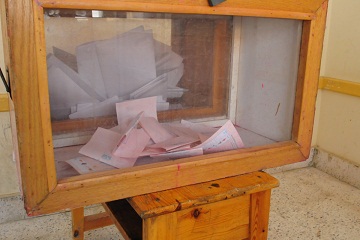Group claims that recent government legislation is directed at obliterating them
CAIRO: After winning 88 seats in the 2005 parliamentary elections, the Muslim Brotherhood has become the single largest opposition bloc in parliament. Despite their recent success however, the Muslim Brotherhood hasn’t been allowed to become a licensed political party. Instead, they currently operate as a group and run as independent candidates in parliamentary elections.
But as independent candidates, their record is impressive. In the 2005 parliamentary elections, the Muslim Brotherhood won 63 percent of the seats they contested, while the National Democratic Party won only 27 percent. The Brotherhood claim that their success has put them in the government’s crosshairs and that the government is allegedly going to legislate them out of politics altogether.
With local and international pressure exerted on the government for political liberalization recently, hopes for freer elections were raised that have yet to be fulfilled. Last year President Mubarak announced an initiative to amend Article 76 of the constitution, which states how the president is chosen, but the amendment fell short of independent groups’ expectations.
Previously the article had stated that two thirds of the parliament, which is dominated by the National Democratic Party, chooses a candidate, who then faces a nationwide referendum. The amended Article 76, which ostensibly allows multi-candidate presidential elections to take place, also sets a number of criteria for presidential candidates that critics say are unattainable for candidates outside the NDP.
These conditions place strictures on both political party and independent presidential nominations.
In order for a political party to be eligible to nominate a presidential candidate, that party now has to hold at least 5 percent of the seats in parliament. With recent Brotherhood successes, they are the only party holding sufficient seats to nominate a candidate, however, the stricture that they cannot run as a party prevents their nominating a candidate.
In my opinion, the main issue governing these cases is establishing succession of power. There s no doubt that the parliamentary elections in which the Brotherhood won 88 seats has enabled them to get over the unattainable conditions that the government has laid to make [the NDP] the only player, comments Mohamed Habib, the first deputy of the Brotherhood’s supreme guide.
With the 88 seats, there s a chance for the Brotherhood to achieve another victory in the local council elections and the Shura council elections to be able to run for presidency, Habib said.
With the Brotherhood pinning its hopes on a victory in the local council elections, the government announced last February that they would be postponed for two years. The Brotherhood claims that the move is directed at them.
It s true that the Brotherhood s agenda doesn t have the presidency on its list, explains Habib. But the fears that the Brotherhood might use their success either to nominate or support a presidential candidate have led the regime to postpone the local council elections for two years and the extension of the use of the Emergency Law for two years.
I don t expect that the government or the regime itself would be existent in four years, it might even change from within itself. But if it did survive, it will exert more constraints on independent and Brotherhood candidates, says Dr. Amr Shobaki, an analyst from Al Ahram Center for Political and Strategic Studies. These constraints will be exerted because the regime will suffer from more weakness.
In an interview with Al Ahram newspaper, Mufid Shehab, minister of state for Shura Council affairs and a member of the central committee in the National Democratic Party, announced that President Mubarak is currently reviewing the parliament s suggestions on constitutional amendments due to take place next year.
With independents effectively banned from running for president, opposition groups fear that they will be prevented from running for parliament as well.
I think that the talk now in the National Democratic Party is to include a constitutional amendment that will ban independents from running for parliament. The amendment would deprive independents and the Muslim Brotherhood of nomination, Habib said.


